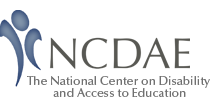NCDAE Accessibility Newsletter - February 2006
In this Edition:
- Feature Article - ATIA Conference: NCDAE Information Summary
- Tips and Tools – Microsoft Word
- Upcoming Webcast - NIMAS in IDEA, What You Need to Know Now
- Factoid
- Affiliate Highlight - Kristine Neuber
- In the News – The Podcasting Revolution
This Month's Feature
ATIA Conference: NCDAE Information Summary
By Stephanie Holt and Martin Blair
On January 20, 2006, the National Center on Disability and Access to Education (NCDAE) and the National Center on Accessible Information Technology in Education (AccessIT) teamed to sponsor a mini-strand at the ATIA National Conference held in Orlando, Florida. The following includes highlights of the NCDAE mini-strand sessions. If you are interested in more detailed information on any one presentation, please go to ncdae.org/activities/atia06/presentations.php. Each presenter has graciously allowed us to archive their presentation on the NCDAE site.
Marsha Allen of the Center for Assistive Technology and Environmental Access presented information about accessibility and usability. She focused on the need to ensure that electronic information technology is usable, which assumes accessibility. Her second session focused on specific strategies for accomplishing this goal.
Information technology has many potential benefits for people with disabilities. Pat Brown and her team at AccessIT developed an awareness video of the barriers experienced by students with disabilities to accessing information technology in education settings. The video also included some suggestions for making positive changes to increase accessibility in these environments. This awareness video was offered as a key resource to any information technology training.
Madeleine Rothberg discussed how everyone learns differently, and therefore, how one accessibility compliant resource may mean accessibility for everyone, but be optimal for no one. Therefore, a transformable, flexible resource system is more conducive to personalizing learning. Rothberg and her colleague Joseph Scheuhammer from the University of Toronto Adaptive Technology Resource Centre then demonstrated a number of accessibility technologies. One example includes Web-4-All, which provides users with a personal "smart card." This smart card automatically changes a computer's settings to that of the individual's preference, thus providing an individualized computer accessibility solution. The Inclusive Learning Exchange (TILE), Collection Workflow Integration System (CWIS) and ANGEL Learning were also demonstrated.
More people, including those with disabilities, are looking to distance learning to obtain an education. Sheryl Burgstahler discussed her research regarding accessibility and distance learning. Accessibility is usually not included in the production phase of distance learning programs. In her research, Burgstahler found ten indicators of an accessible distance learning program that can easily be applied easily to any distance learning program.
In Marsha Allen's second session, she presented the steps to create a distance learning module accessible to all students. The module development guideline can be easily altered to help a distance learning program get started on the accessibility pathway.
Martin Blair and Kurt Johnson hosted the last session of the NCDAE strand. This session consisted primarily of questions regarding accessibility issues. Blair and others provided additional information on some of the services and resources provided by the organizations that had presented earlier that day. Many education institutions are implementing distance education programs and are experiencing problems regarding accessibility. This session provided attendees with information for making their programs more accessible.
The discussion paper and summary paper from the conference can be found on the NCDAE website at: http://ncdae.org/activities/#atia
Tips and Tools
Microsoft Word
Microsoft Word is currently the most common word processor on the market. Because it is so common, the .doc format has become the de facto standard for text documents. Word files can also be the starting point for other files, such as PDF and HTML.
NCDAE has created a fact sheet that is designed to help you understand the accessibility features and challenges of Word. It addresses how to increase the native accessibility of a Word document and how to export a Word document to RTF, PDF and HTML formats. We hope that you will not only read this fact sheet, but add your comments and experiences so we can continually expand this resource.
Read the full text of this Tips and Tools: http://ncdae.org/tools/factsheets/word.php
Webcasts
Upcoming Webcast – Tuesday, February 28th, 2006
NIMAS in IDEA, What You Need to Know Now
The National Instructional Materials Accessibility Standard (NIMAS) is an important new piece of the reauthorized IDEA. It will guide the ways in which textbooks and core instructional materials are delivered so they may be converted easily into accessible formats. Although the final federal regulations have yet to be released, directors of special education will need to know enough about NIMAS to understand how to fill out the federal forms for the coming year. Each state will be asked to provide assurances about NIMAS (e.g., checking the box) and to opt in or out of the national repository, the National Instructional Materials Access Center (NIMAC). NCDAE is pleased to offer a Webcast on this important new piece of IDEA and hope it will assist states in their preparation for this upcoming fiscal year.
You will be able to tune in to the audio-only broadcast free of charge beginning 10 minutes before the broadcast begins. The broadcast will last approximately one hour. You will be able to access the webcast on your computer using either Windows Media Player or Quicktime. Archives (transcript and audio) will be available shortly after the conclusion of the broadcast. The broadcast will be captioned for the deaf and hard of hearing and captioned archives will be available a few days after the conclusion of the broadcast.
To register for the webcast or for more information, visit our website:
http://ncdae.org/webcasts/
Factoid
According to usability guru Jakob Nielsen, the internet is growing at a rate of 18% a year and now boasts One Billion Internet Users. A second billion will have joined the internet population by 2015. Furthermore, a Danish Center for Accessibility recently found that 25% of all web users have some kind of accessibility problem. While this includes both technical problems and functional disabilities, the numbers are staggering! Websites that are not designed accessibly are disregarding a potential quarter of a billion users.
Affiliate Corner
 Affiliate Highlight - Kristine Neuber
Affiliate Highlight - Kristine Neuber
My name is Kristine Neuber. I work at the Kellar Institute for Human disAbilities at George Mason University. My primary responsibilities are to provide assistive technology services to all students and employees with disabilities. These services include, assistive technology screenings, training and technical support as well as the production of electronic textbooks and documents through the use of scanning and OCR technologies. I also work as the web accessibility coordinator for the university. As web accessibility coordinator I assist the web team and faculty to ensure that our distance education management tools as well as other system wide applications are accessible.
My interests include enhancing the accessibility and usability of distance education courses, through the use of assistive technology applications and techniques, disability policy and universal design for learning and assessment.
I first came in contact with the National Center on Disability and Access to Education (NCDAE) as a university partner on their WebAIM project. I also have participated in a few web casts for NCDAE.
In the News…
The Podcasting Revolution
Podcasting is one of the hottest new trends in education, it is being used to record and distribute classroom lectures and conference proceedings, as a training and recruitment tool, and as an alternative media format in many libraries.
According to Educause:
"Podcasting" refers to any software and hardware combination that permits automatic downloading of audio files to an MP3 player for listening at the user's convenience. Part of the appeal of podcasting is the ease with which audio content can be created, distributed, and downloaded from the Web. Barriers to adoption and costs are minimal, and the tools to implement podcasts are simple and affordable. Podcasting allows education to become more portable than ever before, giving educators another way to meet today's students where they live and learn—on the Internet and on audio players.
Podcasting can be very helpful for some students with disabilities: it can replace a notetaker for a student who is blind or mobility impaired and allows students with cognitive disabilities to listen to the material at their own pace and as often as they like. However, Podcasting may create accessibility problems for some students who are deaf or hearing impaired.
The popularity and problems of podcasting was recently a hot topic on the WebAIM (Web Accessibility in Mind) discussion forum. It received 22 posts in two days on this very topic. To read this thread, visit: http://www.webaim.org/discussion/mail_thread_sort.php?sort_thread=p then search for podcasting.
Recent articles on the Podcasting craze featured on the NCDAE RSS Feeds include:
'Stanford On ITunes' Is For Everybody
http://www.forbes.com/2006/01/24/stanford-on-itunes_cx_kdt_06conncampus_0124stanford.html?
Apple iTunes U
http://www.podcastingnews.com/archives/2006/01/apple_itunes_u.html
Students and Teachers, From K to 12, Hit the Podcasts
http://www.nytimes.com/2006/01/25/technology/techspecial2/25podcast.html?ex=1138942800&en=64543f40fcee74cd&ei=5070
Students plug in, enroll in 'iTunes U'
http://www.eschoolnews.com/news/showStoryRSS.php?ArticleID=6071
Podcast My Class! Tegrity and Blackboard Bring Enhanced Podcasting to Colleges and Universities Nationwide
http://www.marketwire.com/mw/release_html_b1?release_id=105149
Podcasting: Transforming Middle Schoolers Into 'Middle Scholars'
http://www.thejournal.com/articles/17607
University Professor Takes Ipods To The Classroom
http://www.wfsb.com/Global/story.asp?S=4323684
RETC's 'Podcast for Teachers' Receives National Award
http://www.fordham.edu/Campus_Resources/Public_Affairs/topstories_591.html
7 Things You Should Know About Podcasting
http://www.educause.edu/content.asp?page_id=666&ID=ELI7003&bhcp=1
Podcasting Could Be The Next Big Thing
http://www.venturacountystar.com/vcs/business/article/0,1375,VCS_128_4325620,00.html
UC Podcasting Trial Merges Education With Technology
http://news.enquirer.com/apps/pbcs.dll/article?AID=/20060105/NEWS0102/601050350/1058/NEWS01
Touch User Interface Links Podcasts To Printed Text
http://www.informationweek.com/news/showArticle.jhtml?articleID=175004600
iPods Are New Class Substitute
http://www.thedailyaztec.com/media/paper741/news/2005/11/02/City/Ipods.Are.New.Class.Substitute-1042044.shtml?norewrite&sourcedomain=www.thedailyaztec.com
Texas Company Hopes to Sell Recordings of Professors' Lectures
http://chronicle.com/weekly/v52/i07/07a03701.htm
Drexel University Launches Podcast Series to Help Students Succeed in Earning an Online Degree
http://www.emediawire.com/releases/2005/9/emw284286.htm
Digital Libraries: 'Opening' A Digital Library
http://www.campus-technology.com/article.asp?id=11727
Purdue Makes Lectures Available As Podcasts
http://www.eschoolnews.com/news/showStoryRSS.php?ArticleID=5860
Lecturers Get In Tune With Latest Tool For Learning
http://www.ngfl.gov.uk/news.jsp?sec=5&cat=99&res=87994
New Podcast Targets School Recruiters
http://www.eschoolnews.com/news/showStoryts.php?ArticleID=5675
Library Shuffles Its Collection
http://www.wired.com/news/mac/0,2125,66756,00.html

